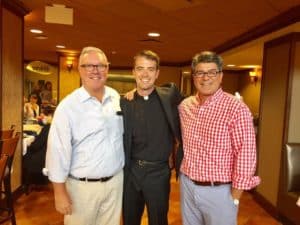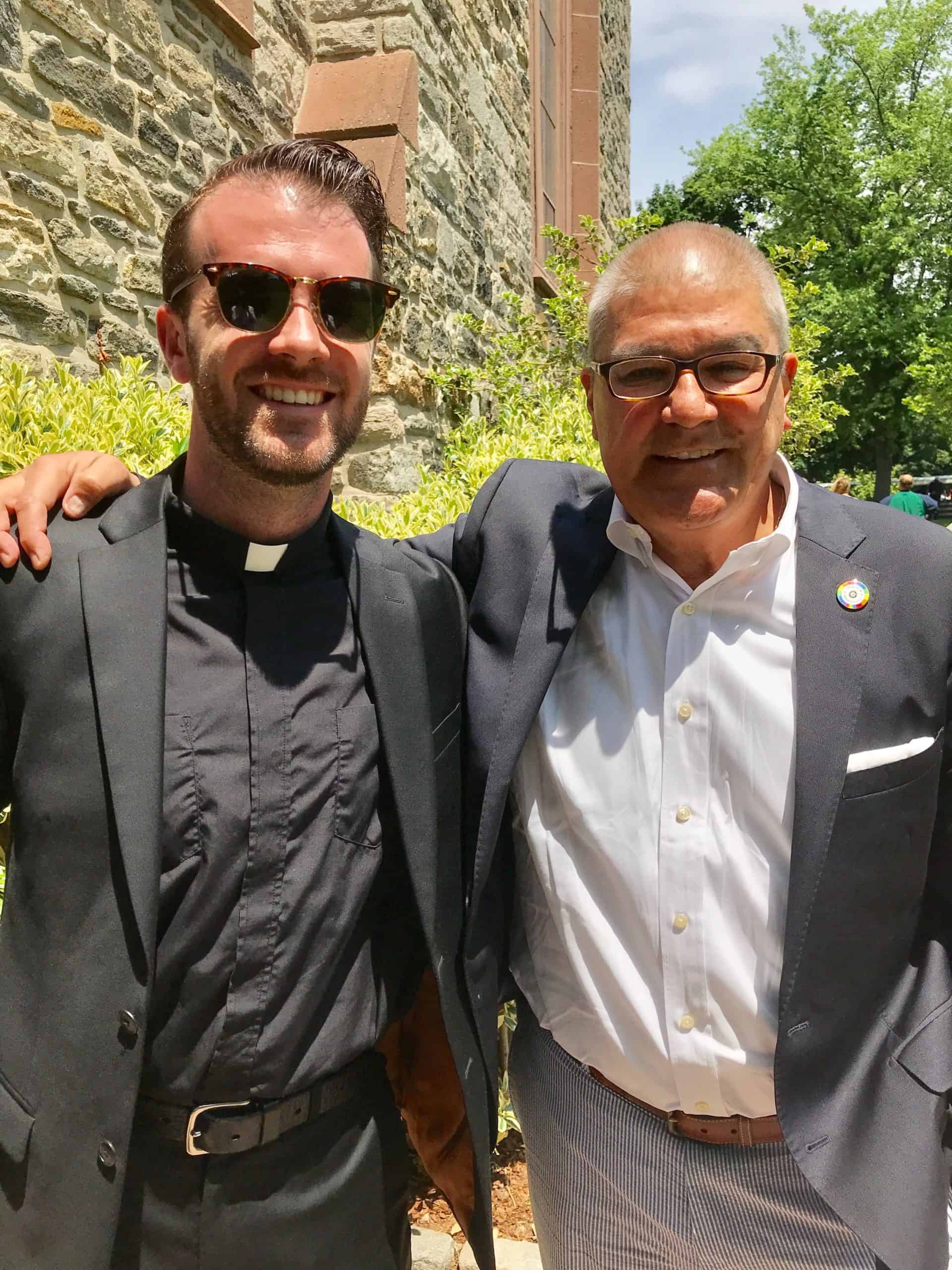When I met Carlos, I wasn’t sure what my long-term plans with the Church were. The hypocrisy of the abuse crisis nagged at me. The openly unwelcoming stance of the American Church struck me as wildly hypocritical. Plus, my parents were intertwined with the Church. At that time, our relationship was deeply strained because of my brother’s ever-worsening heroin addiction and legal troubles. I felt tempted to wipe the slate clean and say goodbye to the Catholic Church where I’d been raised.
Thankfully, I met Jennifer at a parish I was cautiously attending. I felt comfortable enough to share all my frustrations with her. Knowing Carlos’ ability to balance his love for the Church with full knowledge of its flaws, she introduced us.
Our first meal was at a loud bar with gloriously cheap food. Over wings, we shared our life stories and how Jesus fit into them. I explained how I struggled with a Church that seemed like such a mess at the macro level, even if our parish felt like such a home. Our beers became watered down with tears as he shared my sentiments and encouraged me to stick with the parish.
Our second meal was at our beloved parish, St. Ignatius Loyola on the Upper East Side of Manhattan. Carlos had so many roles at the Church: cross bearer, lector, Eucharistic minister. As I walked up to receive communion, he offered me the host saying, “Jake, my brother, the Body of Christ.” I answered “amen” and consumed the sacrament. He followed up, “I love you so much.”
His added lines shook me to my core. At the time, the Church was busy creating lists of people who should not receive the Eucharist. In his simple words, Carlos foreshadowed Pope Francis’ insistence that communion “is not a prize for the perfect but a powerful medicine and nourishment for the weak.” 1, 47: 1039.] Without any theological argument, Carlos began a process of resolving my complicated feelings about a Church that he loved. He became the pharmacist administering the essential medicine.

Pictured from left to right Carlos, Jake, and Jim.
After Mass, we went around the corner to the local bar where we shared a few beers with other friends from Church and Jim, Carlos’ husband of over 30 years. We recalled the best moments from the homily, and laughed about mishaps that had happened at work, and shared plans for the week ahead.
We kept having these two meals over and over again.
Sometimes we’d replace the wings with pad thai, or tacos, but the conversations continued to be a balm. He and Jim always asked about my brother, and offered a shoulder to cry on when the situation got especially bleak. They gave me room to complain about and process the toll his addiction was taking on my family. In their generosity, it became easier for me to be generous to my parents who were bearing the brunt of the trauma.
On Sundays, though, the food didn’t change. His distribution of Communion was never an isolated sacramental act, but the moment that gave clarity to the rest of our encounters. He kept saying, “Jake, my brother, the Body of Christ” and kept living it in our dinners and our beers. I saw the way he and Jim loved each other with a depth I’d not witnessed before.
His Eucharist-informed life became a northstar as I discerned my vocation. I saw how it directed Carlos and I felt called to be directed likewise. Even if the larger Church could be frustrating, how could I deny the potency of his Christ-centered life?
In my third year as a Jesuit, Carlos called me with devastating news: Cancer. Rare. Best doctors. For two and half years, I made regular visits as his condition deteriorated. Right before shelter-in-place orders last March, I made my final visit.
Jim used my visit as a chance to run some errands. Carlos and I had their apartment to ourselves. Because of the morphine, Carlos was barely awake, but for four hours, I sat at his bedside and prayed. In his moments of wakefulness, we’d start a rosary, but he never made it through a decade. Mostly, I held his hand.
In my prayerful imagination, I took on the role of the Beloved Disciple standing at the foot of the cross. I felt so helpless, unable to rouse him or soothe his pain. For a lengthy afternoon I sat and watched him suffer.
He died just a few weeks later.
As I made my retreat two months after that, I found myself in a big empty Church. Other than the late evening summer sun lighting up the windows, the cavernous building was lit only by the sanctuary lamp.
I lamented toward the tabernacle. Why? Why did you take him away from us? How will I know which way to turn without him to guide me?
And Carlos answered the question for me.
“Jake, my brother, it was never about me. I was always pointing toward Him.”
I couldn’t have dreamt that my vocation in the big, messy, glorious Catholic Church would be inspired by “a poor peasant boy from Colombia” (his preferred self-description) and his husband. Carlos taught me, though, that grace through the Eucharist works in ways we can scarcely imagine.
-//-
Photos courtesy of the author.
- Apostolic Exhortation Evangelii Gaudium [24 November 2013 ↩


